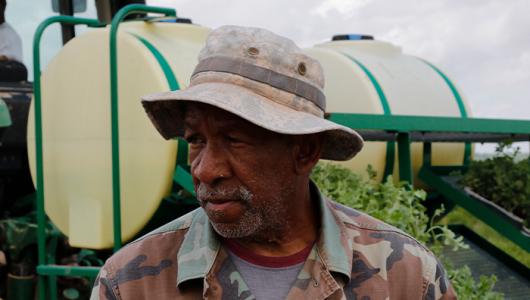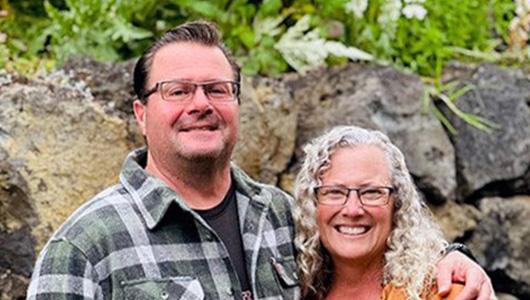Each Friday, meet farmers, producers, and landowners through our #FridaysOnTheFarm stories. Visit local farms, ranches, forests, and resource areas where USDA customers and partners do right and feed everyone.
This week, meet Fredie Manes, retired Marine and self-proclaimed “market gardener.” Life after the military led Fredie and his wife, Patti, back to Louisiana and into gardening and enjoying the “poetry” of planting.
Read the interactive, multimedia version of this Fridays on the Farm story.
The Journey Begins
Seeds. That is where this journey begins. Just like his dad, Fredie always wanted to grow something-vegetables, fruits, flowers—anything and everything. Fredie’s love of agriculture started growing when he was in fourth grade.
“My dad always had a huge garden,” Fredie recalls. “I begged him for a little place to plant something. So, dad tilled up a spot, and gave me some potato and green bean seeds.”
Throughout high school, Fredie worked with his dad in their large garden in southwest Missouri. “I always wanted to be a farmer, but when you are 18 years old and fresh out of high school, buying land doesn’t seem like an option,” he said. “I didn’t really have any experience farming other than gardening.”
Several years later Fredie enlisted in the United States Marine Corps, which required him to travel extensively.
“I guess you could say that my service as a Marine allowed me to have incredible experiences,” he said. “I tell folks I’ve probably traveled the world at least three times.”
As an infantry Marine, Fredie was based in California, North Carolina, and Puerto Rico, and did a tour at the Marine headquarters in Washington, DC. He was deployed oversees multiple times and, ultimately, finished his 21-year career in Hawaii.
Putting Down Roots
During those years of travel, the awe and amazement of gardening and agriculture never left him.
Over the years Fredie and Patti, along with their two daughters, experimented with growing a wide variety of produce and flowers.
The Manes' retired to Louisiana, where Patti grew up, and planted a huge home garden.
"We were growing so much produce, that people would ask if they could buy fresh vegetables from us,” Fredie explained. “Eventually, I realized that farming would be a viable business for us.”
As the operation grew, the Manes decided to focus on growing lettuce and a variety of greens. Coincidentally, that also happened to be the same year that a cold snap hit Louisiana and within the span of a few months two plantings were destroyed by temperatures that dipped into the 20’s.
Overcoming Adversity
Fredie reached out to the Calcasieu Soil and Water Conservation District and his local USDA Service Center in Leesville, Louisiana, to learn more about the technical and financial assistance available. There Fredie met Adam Malcomb, soil conservationist with the Natural Resources Conservation Service.
“When Fredie came into our office we discussed several options,” Adam said. “After a site visit, installing high tunnels was the clear answer.”
Fredie has two high tunnels that he installed on his farm through the use of the Environmental Quality Incentives Program and the Veteran Farmer and Rancher provision in the Farm Bill.
The 2018 Farm Bill has special provisions for veterans, who have been discharged for up to 10 years, who are interested in farming and ranching.
Fredie cannot say enough good things about his high tunnels.
“The high tunnels have been a life saver for me, being able to keep the rain and weather off of the crops is a huge help.”
He attributes the assistance he received from USDA and the Calcasieu Soil and Water Conservation District for expanding his business and protecting his soil and crops.
“I wouldn’t be growing produce at this level and I wouldn’t be in business,” Fredie said. “I think high tunnels are worth three times what they cost because it allows us to have a longer growing season.”
The high tunnels also protect his soil and crops from erosion.
“We are always fighting erosion, so the high tunnels also help us keep topsoil in place,” he said.
An Army veteran himself, soil conservationist Adam Malcomb says it’s good to see veterans interested in farming and agriculture as a profitable job and way of life.
“For a lot of veterans, it is hard to reacclimate to civilian life. Farming gives them an option to participate in their communities as much or as little as they like,” he said. “A farming lifestyle is typically a really good fit for veterans because they are used to getting up early, putting in long hours, and working hard.”
Poetic Planting
Fredie travels to farmer’s markets around the region. Not only is he a producer, but he also serves as the manager of the Alexandria Farmers Market, operated by the Central Louisiana Economic Development Alliance.
“I enjoy talking and connecting with my customers,” he beams.
This fall his crop will include tomatoes grown from seed, all types of greens and lettuce, spinach, and kale.
“All of the hard work is worth it when you go outside to witness seeds coming up from what you’ve planted,” he reflected. “To me that is the miracle. Watching the plant bud, leaf out, and take off from seed. It’s like poetry—it’s that kind of a feeling for me.”
Fredie encourages other veterans thinking about farming to contact their local Soil and Water Conservation District and USDA Service Center.
“The application process is not difficult, and the staff is so helpful. They work with you through every stage of the process,” he said.
More Information
USDA offers a variety of risk management, disaster assistance, loan, and conservation programs to help agricultural producers in the United States weather ups and downs in the market and natural disasters as well as invest in improvements to their operations. Learn about additional programs.
For more information about USDA programs and services, contact your local USDA service center.
Join the Conversation
Follow the #FridaysOnTheFarm story series and other news you can use on farmers.gov and @Farmersgov on Twitter.
Story and Photos by Amy Robertson, NRCS Louisiana


